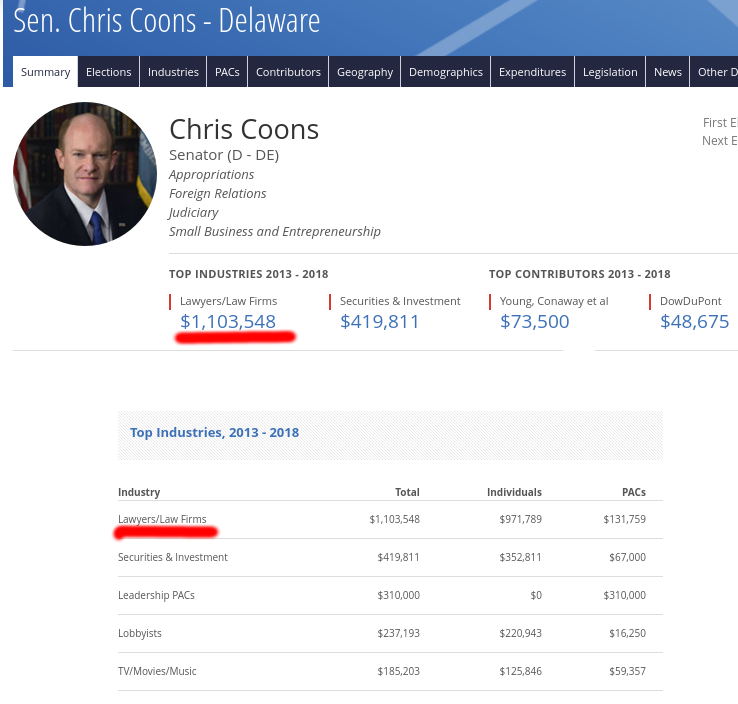
 It's not bribery if they call it "campaign contributions" (right?)
It's not bribery if they call it "campaign contributions" (right?)
WE PROMISED ourselves to focus on EPO affairs and hardly bother with the USPTO until further notice or turnaround. Seeing that 35 U.S.C. ۤ 101 is under threat, however, we still want to document -- not just in our daily links -- what's going on. The latest turn of events was mentioned in yesterday's post. It's about a proposed legislation (with law firms bribing for it) that strives to water down/alter ۤ 101. As we've stressed all along, we find it highly improbable that it will get anywhere, seeing what happened in past years. Regardless, the outcome will depend on what technologists do, as opposed to lawyers.
At a Senate hearing today, EFF Staff Attorney Alex Moss gave formal testimony [PDF] about how to make sure our patent laws promote innovation, not abusive litigation.
Moss described how Section 101 of the U.S. patent laws serves a crucial role in protecting the public. She urged the Senate IP Subcommittee, which is considering radical changes to Section 101, to preserve the law to protect users, developers, and small businesses.
Since the Supreme Court’s decision in Alice v. CLS Bank, courts have been empowered to quickly dismiss lawsuits based on abstract patents. That has allowed many small businesses to fight back against meritless patent demands, which are often brought by "patent assertion entities," also known as patent trolls.
At EFF, we often hear from businesses or individuals that are being harassed or threatened by ridiculous patents. Moss told the Senate IP Subcommittee the story of Ruth Taylor, who was sued for infringement over a patent that claimed the idea of holding a contest with an audience voting for the winner but simply added generic computer language. The patent owner wanted Ruth to pay $50,000. Because of today’s Section 101, EFF was able to help Ruth pro bono, and ask the court to dismiss the case under Alice. The patent owner dropped the lawsuit days before the hearing.
Tillis-Coons Section 101 “Framework” Will Make Patent System Worse for Small Businesses, Consumers
Washington D.C.—EFF Staff Attorney Alex Moss will tell U.S. lawmakers today that proposed changes to Section 101 of the U.S. Patent Act—the section that defines, and limits, what can get a patent—will upend years of case law that ensures only true inventions, not basic practices or rudimentary ideas, should get a patent. Moss is among a panel of patent experts testifying today before the Senate Subcommittee on Intellectual Property about the state of patent eligibility in America.
The Supreme Court ruled in Alice v. CLS Bank that an abstract idea does not become eligible for a patent simply by being implemented on a generic computer. For example, a patent on the basic practice of letting people access content in exchange for watching an online ad was upheld in court before Alice. EFF’s “Saved by Alice” project has collected stories about small businesses that were helped, or even saved, by the Supreme Court’s Alice decision.
A proposal by Senators Thom Tillis and Chris Coons, chairman and ranking member of the subcommittee, would rewrite Section 101 of the Patent Act. The proposal is aimed squarely at killing the Alice decision. It will primarily benefit companies that aggressively license and litigate patents, as well as patent trolls—entities that produce no products, but make money by threatening developers and companies, often with vague software patents.
Section 101, as it stands, prevents monopolies on basic research tools that nobody could have invented. That protects developers, start-ups, and makers of all kinds, especially in software-based fields, Moss will tell senators.
"Those are known as "zombie" bills or legislations."Professor Mark Lemley posted a photo of himself "Testifying in the Senate today" and Benjamin Henrion said "Best intervention is Joshua D. Sarnoff, mentions that even 101 section is rewritten, there will be constitutional challenges..."
He later added that "AI is just software with data. Nothing patentable here, even if you have the impression it's magic..."
There are several Koch-funded 'scholars'/think tanks in these hearings and they tell all the usual lies. Henrion called it "Senate hearing on software patents, destroying Alice and restoring patent trolls..."
We're pretty optimistic that nothing will change at the end. They tried it in past years as well and it was shot down within a couple of months. They try it every summer. Those are known as "zombie" bills or legislations. ⬆